
According to the American Institute of Stress, 94% of Americans claim to experience chronic stress. Can Chinese herbs for stress help with this overwhelming epidemic?
From work deadlines to family commitments to financial challenges, stress seeps into our daily lives from all angles. While triggers can span from mild issues like your traffic-heavy commute to work to significant traumas like loss, chronic stress impacts our physical and mental health the same.
Avoiding stress is impossible, and beating stress doesn’t have to mean hiding from life. The key is to find simple, effective, healthy ways to manage the situations life throws at you. That’s where Chinese herbs for stress come in.
With Chinese herbs and adaptogenic supplements, you can reverse the negative effects of stress and build your body’s natural resilience to challenges. Let’s learn how…
What is Stress, Really?
In our fast-paced world, the term “stress” has seeped into our everyday conversations. We may say we feel stressed or are stressed, but what exactly is stress?
Adrenal vs. Emotional Stress
Simply put, stress is your body’s response to a potential threat. When you sense danger—whether it’s real or imagined—the body’s defenses kick into high gear in a rapid, automatic process known as the “fight-or-flight” reaction. This reaction is what is often referred to as adrenal stress. This is when the adrenal glands work overtime to release stress hormones like cortisol so you act quickly to escape or confront a danger.
But not all stress feels like a jolt to the nervous system – many times, our stress has a deeper root. This is emotional stress.
Emotional stress refers to the distress, frustration, or turmoil we may feel when faced with challenging situations, life changes, or persistent worries. Rather than a quick reaction to a threat, this type of stress is the mind’s response to external pressures, which can lead to feelings of anxiety, sadness, frustration, or overwhelm. Unlike physical stress, which is often triggered by a tangible event, emotional stress is deeply intertwined with our perceptions, thoughts, and reactions to life. It can strain mental health, affect physical well-being, and impact one’s ability to function effectively in daily life.
Acute vs. Chronic Stress
Stress can be acute (short-term) or chronic (long-term). Acute stress is the body’s immediate response to a threat, like slamming on your brakes to avoid a car accident. Chronic stress, on the other hand, is the kind that builds up over time and significantly depletes your adrenal glands, hormone balance, and energy. This lingering type of stress is usually caused by ongoing pressures, such as work, finances, or family challenges.
More Than a Feeling: The Negative Effects of Stress
Stress is not just the feeling of being overwhelmed; it’s a physical and psychological response that can have significant effects on your overall health. When the body is under stress and goes into the state of “fight or flight” regularly, it can upset the body’s natural state of balance and pave the way for irritating symptoms.
Let’s take a closer look at how chronic stress may be impacting your health beyond feeling overwhelmed or frustrated:
Stress and Depression
Chronic stress can deplete your energy and sabotage your brain health, which can later lead to mental health concerns like depression. Over time, stress depletes feel-good neurotransmitters such as serotonin and dopamine. This disrupts your mood balance and can pave the way for depression.
Stress and Anxiety
Stress and anxiety are closely linked, as stress can provoke anxiety, and anxiety can lead to more stress. This is because the body’s stress response heightens your state of alertness (such as increasing heart rate, breathing rate, and hyperfocus) which can exacerbate feelings of anxiety. When the stress trigger is not actually dangerous, however, this can make everyday situations seem daunting.
Stress and Anger
Have you ever accidentally lashed out at a loved one because something at work or school was stressing you out? Unfortunately, stress can lead to intense emotions like anger or panic, which can strain your relationships and leave you feeling guilty (and even more stressed). Why does this happen? Under stress, the brain’s rational processing centers are ignored in favor of more primal (and quick-acting) responses. If we were really in danger, this would be a helpful thing. But in everyday life, this leads to heightened irritability and anger.
Stress and Pain
Stress can significantly increase the body’s sensitivity to pain. One of the most common symptoms is stress headaches, a common type of tension headache that results from the tightening of muscles in the neck and scalp. Additionally, stress has been shown to worsen conditions like fibromyalgia, arthritis, or any condition related to inflammation.
Stress and Sleep
If you’ve ever had trouble sleeping the night before a big test, trip, or other challenge, you’ve experienced the direct effect of stress on sleep. Stress activates the body’s alert system, making it difficult to relax and fall asleep. Over time, this can lead to chronic sleep disruption which only makes stress worse (and prolongs the cycle).
Stress and Fatigue
Chronic stress drains the body’s physical and emotional energy reserves. It goes beyond just a matter of feeling tired – it’s a profound feeling of exhaustion and adrenal fatigue that can impair your daily functioning and reduce your quality of life.
Stress and Digestion
When stressed, the body diverts energy away from the digestive system and prioritizes the muscles and other systems needed for that “fight or flight” response. This can lead to a variety of gut health problems, including indigestion, stomach cramps, and changes in appetite. Chronic stress can further exacerbate gastrointestinal conditions like irritable bowel syndrome (IBS) and gastroesophageal reflux disease (GERD).
Stress and Chronic Disease
Long-term stress has a detrimental effect on nearly every system in the body. It can lead to adrenal fatigue (where the adrenal glands are overworked), contribute to oxidative stress (which can damage cell structures), and increase the risk of chronic diseases (such as heart disease, diabetes, and hypertension). Stress also weakens the immune system, making the body more susceptible to infections or cancer, and slows down healing and recovery.
Stress and Aging
We all want to age gracefully and stay as youthful as possible. Unfortunately, chronic stress makes the hands of time tick faster. Excess stress accelerates the aging process through oxidative stress and inflammation. Oxidative stress occurs when there’s an imbalance between free radicals and antioxidants in the body, leading to cell damage. This cellular damage contributes to aging signs, such as loss of skin elasticity, wrinkles, and dry or thinning hair.
Stress also triggers inflammation, which can accelerate the breakdown of collagen, further contributing to aging skin. Beyond lines and wrinkles, chronic oxidative stress can lead to health issues like arthritis, increased aches and pains, and reduced mobility – all of which make the body feel older than its chronological age.
The Chinese Medicine Perspective on Stress
As we can see, letting chronic stress rule your life isn’t such a good plan. Stress not only leaves you feeling unfulfilled and frustrated but can also trigger some significant health issues and chronic diseases.
In Western medicine, stress reduction is managed primarily through practices like exercise, meditation, mindfulness, boundary setting, and psychotherapy. While these are great lifestyle habits, a holistic Chinese medicine approach to relieving stress can help you make faster and more lasting changes.
What is Stress in TCM?
Traditional Chinese Medicine (TCM) offers a unique lens through which to view and treat stress. Rather than focus just on the symptoms of stress (like headaches, anxiety, or poor sleep), TCM seeks to address the root causes of stress and restore balance and harmony to the body.
According to TCM, stress affects the balance of Qi (pronounced “chee”), the vital life or energy force that flows through pathways in the body. Stress, especially when chronic, can lead to an imbalance of Qi, which disrupts your emotional, physical, and mental well-being.
Patterns of Stress in TCM
In all forms of stress, the healthy flow of Qi is disrupted. But the way in which it is disrupted – and which organ systems it affects – all has to do with your body’s unique constitution, other health issues, and personality.
In Traditional Chinese Medicine (TCM), stress is not viewed as a singular condition but rather as a symptom of imbalance within the body’s energy system. TCM has several distinct patterns of stress, each with its unique set of manifestations. Understanding which of these patterns best matches your experience is the key to finding effective natural herbs for stress.
Let’s take a look at a few of the most common patterns of stress in TCM:
- Liver Qi Stagnation
This pattern is most directly associated with emotional stress in TCM. When we feel upset, frustrated, or angry, this causes the flow of Qi (energy) in the Liver system to become stagnant. Stress from Liver Qi stagnation typically includes irritability, mood swings, tension headaches, and menstrual irregularities in women. You may also experience a feeling of a lump in the throat, difficulty swallowing, or lose your appetite when stressed. - Spleen Qi Deficiency
Stress can impact the digestive organs’ (Spleen and Stomach) ability to transform and transport nutrients. This leads to a deficiency of Spleen Qi, which then causes fatigue, worry, digestive issues like bloating and loose stools, and a feeling of heaviness. Stress caused by Spleen Qi deficiency tends to have an element of anxiety or overthinking. - Heart Fire
In TCM, excessive stress or emotional upheaval can lead to an accumulation of “fire” in the Heart. This pattern manifests as anxiety, restlessness, insomnia, palpitations, and a feeling of heat or flushing. Individuals may have trouble calming their minds and report feeling constantly on edge. - Kidney Yin Deficiency
Chronic stress depletes the body’s reserves, leading to a deficiency in Kidney yin, which is responsible for cooling and moistening the body. Symptoms of this pattern include night sweats, dry mouth, dizziness, a ringing in the ears (tinnitus), and a sense of heat in the evenings. This is a deep level of exhaustion and burnout.
The Best Chinese Herbs for Stress
Now that we have a good idea of what stress looks like from the perspective of Chinese medicine, let’s explore the best natural herbs for different types of stress.
Each of these formulas contains Chinese medicinal herbs or adaptogenic herbs that may help support a healthy nervous system and better mental-emotional balance. Beyond helping you ease stress and reduce the negative effect stress has on the body, they can also help you build up your resistance to stress so you can find more joy and peace in daily life.
Best Herbs for Overall Stress Relief
These formulas are great all-around choices to reduce the effects of stress and feel more at ease.
-
Sale!
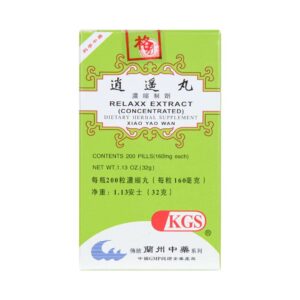 Xiao Yao Wan – Relaxx Extract – Lanzhou Traditional Herbs (KGS)
Starting at $7.89
Add to CartSelect options
This product has multiple variants. The options may be chosen on the product page
Xiao Yao Wan – Relaxx Extract – Lanzhou Traditional Herbs (KGS)
Starting at $7.89
Add to CartSelect options
This product has multiple variants. The options may be chosen on the product page
Xiao Yao Wan
Xiao Yao Wan is the “go-to” formula for stress that feels irritable and frustrating. When you feel like you’re stuck, this formula helps you move through life more easily. It’s also a helpful formula to ease PMS-related mood swings and tension.
Reishi 415 Capsules by Real Mushrooms
Reishi is a treasured medicinal mushroom that has been proven to ease anxiety, boost immunity, and promote restful sleep. That makes this adaptogenic mushroom a great addition to any wellness routine or stress prevention plan.
-
Sale!
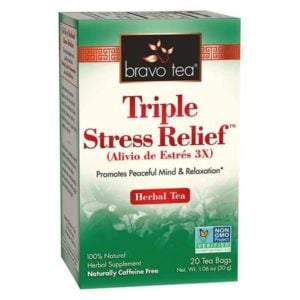 Triple Stress Relief Tea – by Bravo Tea
Starting at $6.99
Add to CartSelect options
This product has multiple variants. The options may be chosen on the product page
Triple Stress Relief Tea – by Bravo Tea
Starting at $6.99
Add to CartSelect options
This product has multiple variants. The options may be chosen on the product page
Triple Stress Relief Tea
Triple Stress Relief Tea is a daily dose of relaxation. Formulated to provide support for stress relief and calm the nervous system, this tea has a gentle calming effect.
Calming Herbs for Stress and Relaxation
Emotional stress can be hard to manage, especially when your triggers are part of everyday life. That’s when combining stress reduction techniques (like meditation and exercise) and herbal medicine can really make a difference. These herbal formulas help nourish and support the over-stressed systems in the body so you can stop stress at the root and return to balance.
-
Sale!
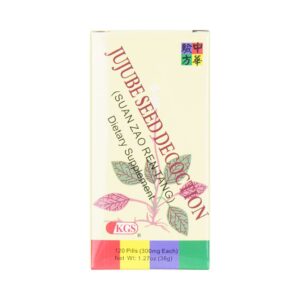 Suan Zao Ren Tang – Jujube Seed Decoction
Starting at $6.45
Add to CartSelect options
This product has multiple variants. The options may be chosen on the product page
Suan Zao Ren Tang – Jujube Seed Decoction
Starting at $6.45
Add to CartSelect options
This product has multiple variants. The options may be chosen on the product page
Suan Zao Ren Tang
This formula focuses on nourishing and calming the Heart system and can be most effective if you experience stress with anxiety, a restless mind, or trouble falling asleep due to stress.
Magic 15 Help Sleep Calming Tea
This herbal tea calms the Heart and nourishes the blood to ease stress and worry – especially before bedtime.
Best Herbs for Stress and Pain Relief
Stress can easily aggravate any existing pain conditions you have. And vice versa – pain itself can disrupt your daily life, your sleep, and trigger chronic stress. With these formulas, you can ease both pain and stress to reclaim your comfort.
Free and Easy Wanderer Plus (Jia Wei Xiao Yao Wan)
While Xiao Yao Wan alone is great for easing stress, Jia Wei Xiao Yao Wan is particularly helpful for stress with a significant level of heat or inflammation. This is the case with most pain conditions, and this formula can be a helpful way to ease both and promote healing.
Kwan Loong Pain Relieving Oil
Topical herbal formulas are an easy way to stop pain in its tracks. This particular oil has a relaxing and soothing menthol scent that also eases the mind and calms irritation.
Best Herbs for Mental Stress & Brain Fog
Feeling unfocused, foggy-headed, and unmotivated are tell-tale signs of chronic stress and burnout. With the help of cognitive-boosting herbs, you can both ease your stress and restore your brain power.
Real Mushrooms Lion’s Mane Capsules
Like Reishi, Lion’s Mane is a powerful medicinal mushroom and stress adaptogen. But, it also has a particular affinity for supporting the brain and nervous system. Using Lion’s Mane can help you focus better and clear brain fog.
Ginkgo Biloba Tincture
Ginkgo biloba is another adaptogenic botanical that helps the body better adapt to stress. Research shows that it can help reduce high levels of stress hormones (like cortisol) while also boosting brain function and memory.
Adaptogen Herbs for Strength, Stamina, and Stress Relief
Adaptogenic herbs for stress are a proactive way to manage overwhelm and prevent burnout. Adaptogens work by building your body’s root resilience to stress, so you don’t “sweat the small stuff” and can take on bigger challenges mindfully.
Chinese Herbal Soup and Broth Mix for Stress Relief
Food is medicine, especially when you cook with Chinese medicinal herbs and adaptogens! This herbal soup and broth kit from root + spring is the perfect way to fight stress and build up your resilience while eating nourishing foods like soup, rice, congee, and stews.
Cordyceps-M Capsules by Real Mushrooms
Cordyceps is a special fungus that has been used in traditional medical systems for thousands of years. It is best known for its ability to support stamina, performance, and energy, but it also has powerful adaptogenic properties to reduce stress.
Stop Stress, Start Supplementing
Stress is part of life, but we don’t have to suffer from it (or its negative health effects)! Stress is a condition we can manage, especially with help from adaptogenic Chinese herbs.
Start your stress-free life by choosing an herbal formula that suits your stress relief needs. Then, pair your daily dose with a healthy diet, exercise, and adequate sleep to create your well-rounded stress management plan.
Shop these formulas or explore our collection of herbs for anxiety, depression, sleep, and well-being!


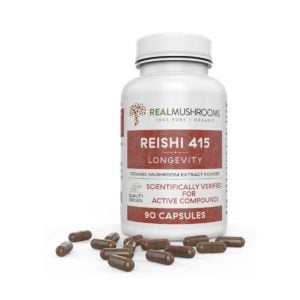 Reishi Mushroom Capsules by Real Mushrooms
Reishi Mushroom Capsules by Real Mushrooms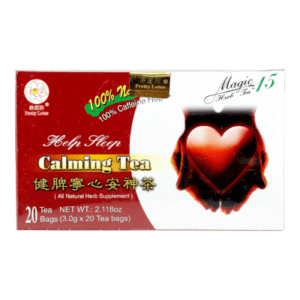 Magic 15 Help Sleep Calming Herbal Tea
Magic 15 Help Sleep Calming Herbal Tea
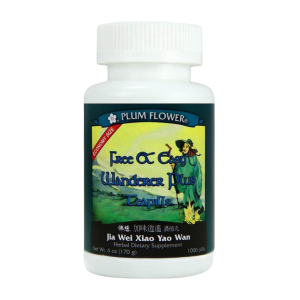 Plum Flower – Free and Easy Wanderer Plus (Jia Wei Xiao Yao Wan)
Plum Flower – Free and Easy Wanderer Plus (Jia Wei Xiao Yao Wan)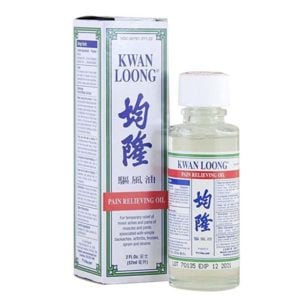 Kwan Loong – Pain Relieving Oil – 2fl oz
Kwan Loong – Pain Relieving Oil – 2fl oz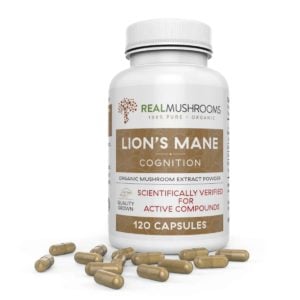 Lion’s Mane Mushroom Capsules – by Real Mushrooms
Lion’s Mane Mushroom Capsules – by Real Mushrooms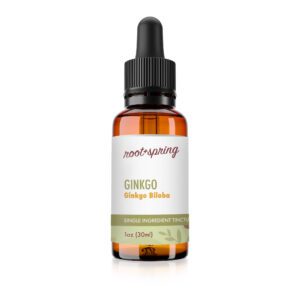 Bai Guo Ye (Ginkgo Biloba Leaf) – Liquid Extract (Tincture)
Bai Guo Ye (Ginkgo Biloba Leaf) – Liquid Extract (Tincture)
 Chinese Herbal Soup and Broth Mix for Stress Relief – by root + spring
Chinese Herbal Soup and Broth Mix for Stress Relief – by root + spring
 Cordyceps (Militaris) Mushroom Capsules by Real Mushrooms
Cordyceps (Militaris) Mushroom Capsules by Real Mushrooms